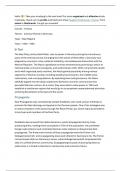Hello ! Take your studying to the next level! For more organized and effective study
materials, check out my profile and flashcard shop Maggie's Flashcards - Payhip. From
notes to flashcards, I've got you covered!
Course : History
Theme : Interwar Period in Germany
Topic : Nazi Regime
Years : 1929 - 1939
In Text
The Nazi Party, led by Adolf Hitler, rose to power in Germany during the tumultuous
years of the interwar period. Emerging from the ashes of World War I, Germany was
plagued by economic crisis, political instability, and widespread discontent with the
Weimar Republic. The Nazis capitalized on these sentiments by promising a return to
national pride, economic prosperity, and authoritarian order. With a charismatic leader
and a well-organized party machine, the Nazis gained popularity among various
segments of German society, including wealthy businessmen, the middle class,
nationalists, and rural populations. By exploiting fears and grievances, the Nazis
skillfully tapped into the deep-seated anti-Semitism and anti-communism that
pervaded German culture. As a result, they were able to seize power in 1933 and
establish a totalitarian regime that would go on to perpetrate unprecedented atrocities
and bring devastation to Europe and the world.
Propaganda
Nazi Propaganda was controlled by Joseph Goebbels, who used various methods to
promote the Nazi ideology and appeal to the German people. One of his strategies was
to restrict freedom of the press through the Reich Press Law, which required all editors
to be Aryan and members of the Nazi Party.
Goebbels also ensured that radios became a useful propaganda tool by mass-
producing them, making them accessible to 70% of the population. He prohibited
foreign radio stations and controlled German radio stations to disseminate Nazi
propaganda. The three main themes of Nazi propaganda were the Führer cult,
Volksgemeinschaft, and scapegoating Jews (and others) for Germany's ills. The Führer
cult portrayed Hitler as Germany's savior, while Volksgemeinschaft emphasized the
idea of a unified German community. Scapegoating focused on portraying Jews as
subhuman or a threat to Germany's racial purity and economic future.
, Hitler's own political career was not initially successful; he lost the 1932 German
presidential election to incumbent President Paul von Hindenburg. However, Hitler did
use sport as a means of controlling attitudes by promoting Nazi symbols at stadiums
and insisting that international teams salute during the National anthem. The 1936
Berlin Olympics were a significant event, with Germany winning more medals than any
other country, but Jesse Owens' four gold medals and multiple records set or equalled
during the games were a setback for Hitler.
Architect Albert Speer was responsible for designing large stone buildings that
embodied Nazi ideology, featuring massive flags, domes, arches, and pillars to create
an air of grandeur. Literature was heavily censored under the Nazis, with millions of
books being burned on public bonfires. Film was also used as a propaganda tool, with
official newsreels and Nazi-produced films featuring anti-Semitic themes.
Music was another medium used by the Nazis to control attitudes, with jazz being
banned as inferior and traditional German folk music and classical music promoted
instead. Goebbels used three tactics to make the Nazi ideology and Hitler appealing: he
brought Hitler to speak across the country using airplanes, broadcast speeches on
radio, and organized rallies to excite supporters.
Police State
The Nazi regime established a police state, where the government exercised strict
control over the lives of its citizens through surveillance and repression. The SA, or
Sturmabteilung, was a paramilitary organization that played a significant role in the Nazi
Party, but it was eventually purged by Hitler in the Night of Long Knives in 1934.
The SS, or Schutzstaffel, was a separate organization responsible for internal security
and policing, and was characterized by its black uniforms. The Gestapo, or Nazi secret
police, was led by Heinrich Himmler and was responsible for enforcing Nazi rule. The
concentration camps were initially used to imprison political opponents and critics of
the regime, and were later used to persecute Jews and other minority groups.
The SS ran the concentration camps, and the SD was an intelligence agency created by
Himmler to gather information on potential enemies of the state. Dachau was the first
concentration camp established by the Nazis.




